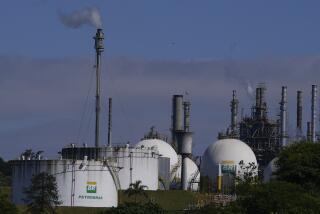OPEC Agrees to Reduce Springtime Production : Energy: Cutbacks are scheduled to begin in March. But reaction is minimal in a skeptical oil market.
- Share via
VIENNA — OPEC formally agreed late Tuesday to curtail its oil pumping in the spring, finally clinching a deal held up by Kuwait’s insistence on special treatment.
The oil market, however, was skeptical that the agreed production cuts would ever be implemented.
The dozen ministers of the Organization of Petroleum Exporting Countries met for about eight hours before resolving their differences over a plan for which the cartel’s president spent weeks soliciting support.
Kuwait had agreed late Monday to join the others in cutting production--but only if promised higher pumping in summer. Tuesday morning, Iran, Nigeria and others balked.
But the final agreement appeared to give Kuwait assurances that its production could go up in the summer if the market was strong enough.
The new agreement--approved after four days of tough bargaining--would pull nearly 1.5 million barrels of crude a day off the market starting March 1.
It sets a new production level of 23.6 million barrels a day for the nations through June.
“We’re still waiting for the cutbacks from the November agreement, which never came,” said Andrew Lebow, senior broker and analyst at E.D. & F. Man International Futures Inc. in New York. OPEC has been producing about 500,000 barrels daily over the November ceiling.
Oil prices have been higher in recent weeks in expectation of a production cut, but light, sweet crude for delivery next month fell 45 cents to $19.53 per barrel Tuesday on the New York Mercantile Exchange.
Kuwaiti Oil Minister Ali Ahmed Baghli late Monday tentatively agreed to cap his oil production to help OPEC keep crude prices steady in the coming months.
But the conditions he attached nearly unraveled the accord. The ministers labored over the wording in the final communique to satisfy all.
Throughout the meeting, Kuwait, whose oil industry was devastated during the Gulf War, wanted special treatment. It argued that it should be allowed to pump freely because it needed to pay $50 billion in costs from the war and for reconstruction.
But Saudi Arabia, the most powerful member and the world’s largest producer, led others in saying no.
They insisted that all members--even Kuwait--must chip in to keep prices from plunging in the spring when demand for crude falls in the United States and other oil-consuming regions.
The nations have flooded the market with 25 million barrels of oil a day, creating a glut that has sent prices slumping. Despite the climb in anticipation of the latest meeting, OPEC’s reference price for a basket of various grades is more than $3 a barrel lower than its $21 target.
OPEC delegates concede that the agreement may not give a sharp kick to prices, but it should hold them steady in the coming months.
Kuwait held out for nearly three days before giving in and agreeing to reduce its pumping to 1.6 million barrels a day.
Analysts estimate Kuwait’s current output at 1.7 million to 1.8 million barrels a day.
More to Read
Sign up for Essential California
The most important California stories and recommendations in your inbox every morning.
You may occasionally receive promotional content from the Los Angeles Times.













